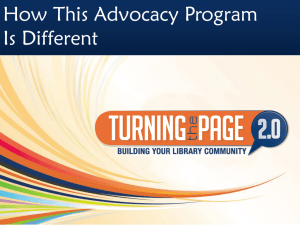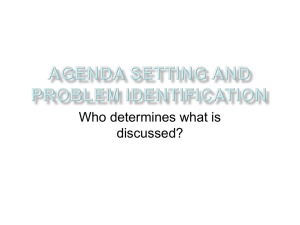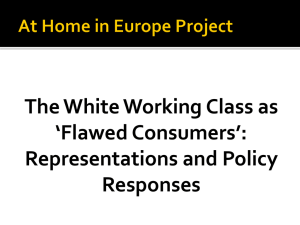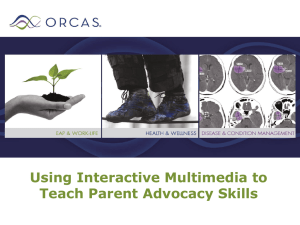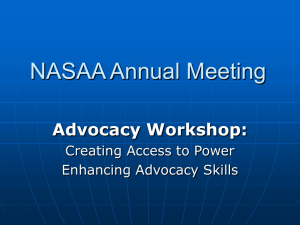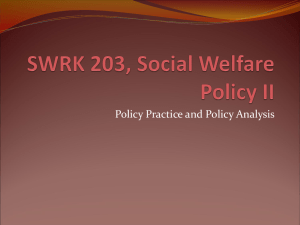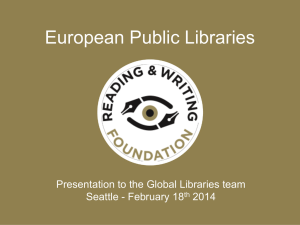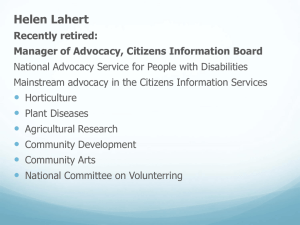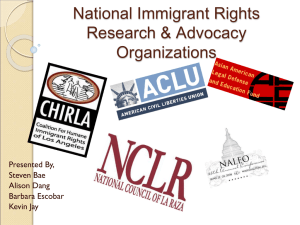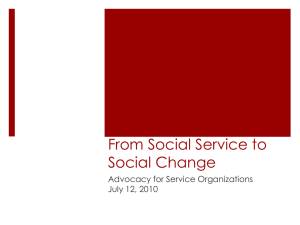Advocacy What works and what doesn`t
advertisement
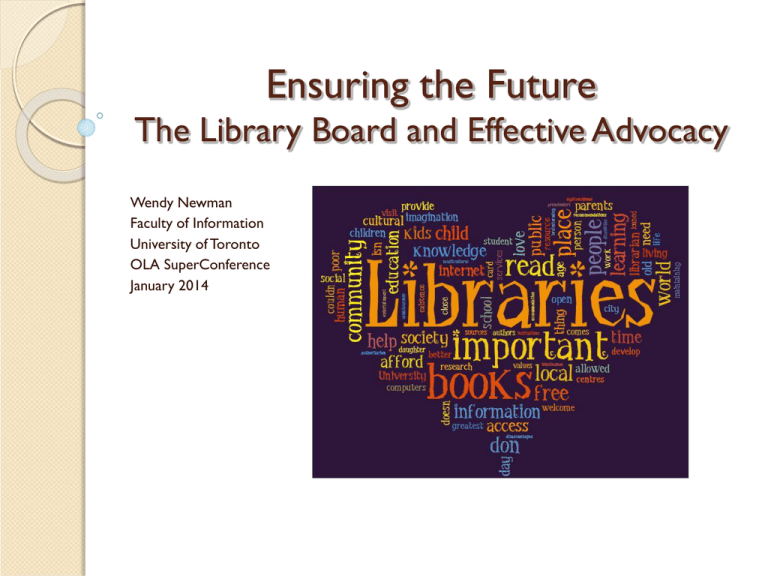
Ensuring the Future The Library Board and Effective Advocacy Wendy Newman Faculty of Information University of Toronto OLA SuperConference January 2014 Proposed agenda Advocacy and Influence101: their reasons, or our reasons? Dynamics of library support (not use): who supports libraries, and why? Advocacy as a way of life: the right message, the right person, the right time Questions for participants Do you have a written advocacy plan for your library? A strategy, but it is not written? No plan and no strategy? A plan to plan for this election year? More Questions Whose job is the advocacy plan re Council? Board Senior staff Board/senior staff team And more Whose job is the advocacy plan re CAO? Board Senior staff Board/senior staff team Why advocacy? Competition Perceptions Stewardship and trust Why not? Too busy Not my job Shouldn’t have to Afraid Too political (ugly, distasteful) for me Looks hopeless Don’t know how Advocacy acts - examples Telling a story (“springboard”) Enabling others to act Expanding awareness The point: let’s be prepared. The Basics People do things for their reasons, not our reasons. 2. Understand, respect, and address their reasons. 3. Cultivate relationships of credibility and trust. 1. Haycock: Successful advocacy is planned, deliberate, and sustained over time. It is not an emergency response. Their reasons Who are “they”? What do they care about? For what are they accountable? Who influences them? What motivates them? How do we find out? Then . . . How are libraries relevant to their priorities or accountability? Bridge the gap! Research: Who supports libraries? It’s about attitude, NOT use! Belief in transformational impacts. Library supporters: well-connected, active in community. “Passionate” librarians involved in the community engage support. Relationships and Influence Develop relationships of respect, credibility, and trust. Consider impacts of stereotypes. Haycock: Like a bank account: deposits before withdrawals. Everyone’s job! Robert Cialdini on Influence Social psychologist Relevance in library advocacy: Haycock summarized in Follett Lecture. http://www.worlib.org/vol19no1-2/haycockprint_v19n1-2.shtml Stenström applied in dissertation. http://eprints.qut.edu.au/59510/1/Cheryl_Stenstrom_Thesis.pdf Robert Cialdini on Influence Reciprocation (feel obliged to return favors) Authority (look to experts) Commitment/Consistency (with commitments and values) Scarcity (less available, more we want it) Liking (if we like, we want to say yes) Social Proof (what others are doing) Messages: content “Zoom zoom”. Building “sound bites”. Key = what matters to targets. Benefits and impacts, not processes, stock, or transactions. Good examples here: http://podcast.cbc.ca/spark/plus-spark_20100608_gerrymeek.mp3# http://www.cla.ca/AM/Template.cfm?Section=Advocacy&Template=/CM/ContentDisplay.cfm&Co ntentID=13784 http://www.ala.org/advocacy/advocacy-university/public-library-resources Developing key messages Asset Sound Bite • Openness to newcomers Toronto Public Library is where newcomers go to become Torontonians. & earning their trust - former Mayor David Miller • Staff expertise & resources for people in employment transition • 24/7 digital access Recession sanctuary. Fast, friendly, self-service. Developing key messages Asset Sound Bite Physical space • Staff expertise & resources The third place. Your partners in knowledge. • We sweat the details so you don’t have to. [Ulla de Stricker] • Children’s services & resources Libraries grow good kids. • Library as place The community’s living room. [Strathcona County PL] Thanks to Prof. Alvin Schrader What are my key messages about my library and . . .? Preschoolers and reading readiness Economic development Diversity Literacy Distance learning School-age children Small business Access to governments Employment Messages: delivery Good spokespersons: passionate, knowledgeable, credible to the target, prepared. They have the relationships in place. All can be advocates in their networks, if messages are consistent. Summary Advocacy is planned, deliberate, sustained. Planning is as essential as passion. Cultivate relationships. Show respect. Address priorities of targets. Match messengers and targets. It’s a way of life. Shush THIS! MOOC Massively Open Online Course Free! Starts 24 February, 2014. wendy.newman@utoronto.ca


